Projects
Concluded - being updated, thanks for your patience!
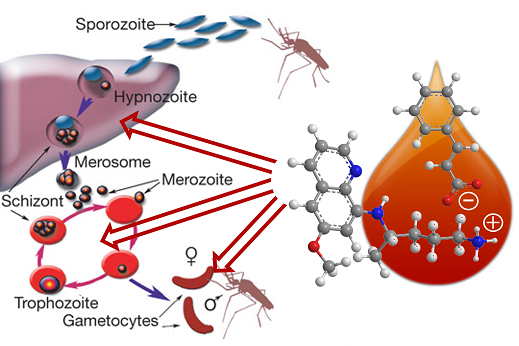 |
|
Rescuing anti-infective drugs through conversion into ionic liquids is a recently concluded project led by our Research Associate Ricardo FERRAZ, which was devoted to the rescuing of antimalarial, anti-retroviral, and antimycobacterial ionizable drugs through their acid-base pairing with suitable counter-ions, to create novel therapeutically relevant ionic liquids. This research was funded by Fundação para a Ciência e Tecnologia (FCT), through project PTDC/BTM-SAL/29786/2017, titled "Two4Three - A small pair against the big three". |
|
 |
|
Repurposing antimicrobial peptides for the agro-food industry is a recently concluded project led by our former Research Associate Cátia TEIXEIRA, which was devoted to the repurposing of antimicrobial peptides for the agro-food industry, with focus on (i) increasing the shelf-life of the Portuguese traditional sausage known as "alheira", and (ii) fighting phythopathogens affecting economically relevant plant crops. This research was funded by Fundação para a Ciência e Tecnologia (FCT), through project PTDC/BAA-AGR/31798/2017, titled "PEPALHEIRA - Whey proteins and derived antimicrobial PEPtide-based active edible coatings for ALHEIRA industry", and involved the collaboration of a company from the "alheira" industry sector. |
|
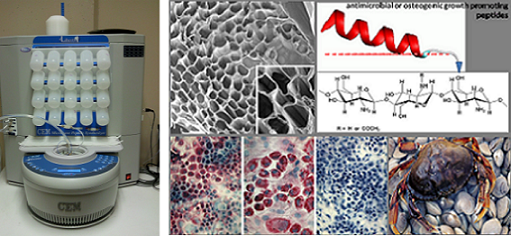 |
|
Peptide-based biomaterials for bone and skin regeneration have been at the core of our research over the part decade, in close collaboration with INEB. Funding was given by Fundação para a Ciência e Tecnologia (FCT), in order to promote research focused at the creation of biocompatible chitosan (PTDC/CTM/101484/2008) or alginate (PTDC/SAU-BEB/101235/2008) biopolymers functionalized with bioactive peptides. These may be designed to have either strong antimicrobial action against MRSA and GRSA bacteria that cause osteomyelitis or osteogenic-growth promoting properties. From 2019 to June 2022, this line of work was supported through grant POCI-01-0145-FEDER-031781, titled "AntINFECT: Bioengineered Advanced Therapies for Problematic Infected Wounds". |
|
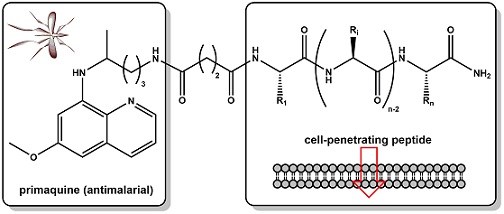 |
|
Malaria chemotherapy is amongst our earliest scientific endeavours, in line with our special interest on chemical approaches to tropical parasitic diseases. Our research effort towards the development of novel antimalarial agents is led in close collaboration with other research groups, such as the Medicinal Chemistry group@iMed.UL, the Centro da Malária e outras Doenças Tropicais@IHMT and the Unidade da Malária@IMM.UL. We have been particularly focused on "recycling" old antimalarials whose therapeutic properties may be somewhat hampered by bioavailability or toxicity issues. Presently, we are interested in covalent and ionic derivatives of primaquine, chloroquine and mepacrine, aimed at improving the drugs' therapeutic properties in order to get multiple-stage antimalarials. Funding by FCT, through projects PTDC/QUI/65142/2006 and PTDC/QUI-QUI/116864/2010 was also instrumental for the consolidation of our research in this field. |
|
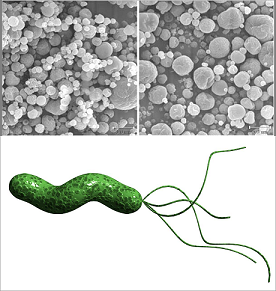 |
In line with our central work on antimicrobial biomaterials, one of our past projects involved chemoselective grafting of specific ligands onto the surface of chitosan biopolymers for removal of Helicobacter pylori bacteria from gastric mucosa; this project was led in collaboration with INEB and funded by FCT (PTDC/CTM/65330/2006). |
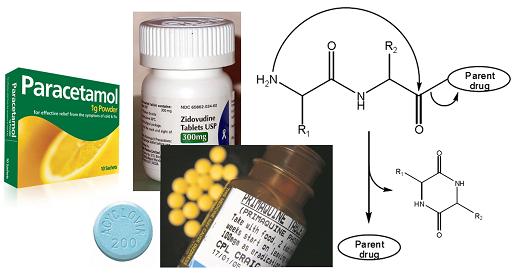 |
|
Cyclization-activated prodrugs based on peptide and peptidomimetic carriers have been one of our earliest research goals. This project had a dual applied and fundamental aim, as were we interested not only in developing potentially useful prodrugs of hydroxylated (paracetamol, acyclovir, AZT) and aminated (sulfanilamides, primaquine) drugs, but also in establishing structure-reactivity relationships and molecular pathways for drug release at physiological conditions. In particular, we were interested in analyzing the influence of the drug - as the leaving group - in the preferred prodrug degradation pathway: direct hydrolytic cleavage of the drug-carrier bond versus intramolecular cyclization to yield a diketopiperazine. This gave us a global picture of scope and limitations of applying oligopeptide carriers in the design of intramolecularly-activated prodrugs. The part of this project that involved potential prodrugs of the antimalarial Primaquine was funded by FCT (POCTI/FCB/39218/2001). |
|
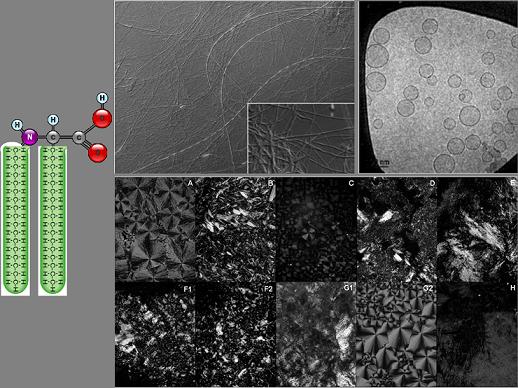 |
|
Anionic double-chained surfactants bearing an amino acid polar head have been a part of our past synthetic goals. This work stemmed from a research project funded by FCT and led by Dr. Eduardo Marques, from CIQUP, which was aimed at the design, synthesis and physico-chemical/biological evaluation of biocompatible gemini surfactants (POCTI/QUI/44296/2002). The main interest of these surfactants resides in their potential for drug delivery and gene therapy. |
|
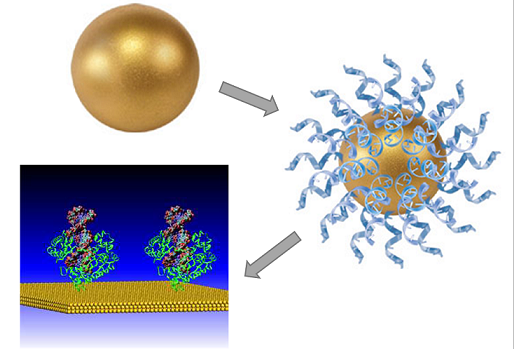 |
|
Peptide-modified gold nanoparticles, under the frame of a project led by REQUIMTE researchers Drs. Eulália Pereira, João Cortez and Ricardo Franco, have been produced in our lab for application in protein-specific biosensors. |
|